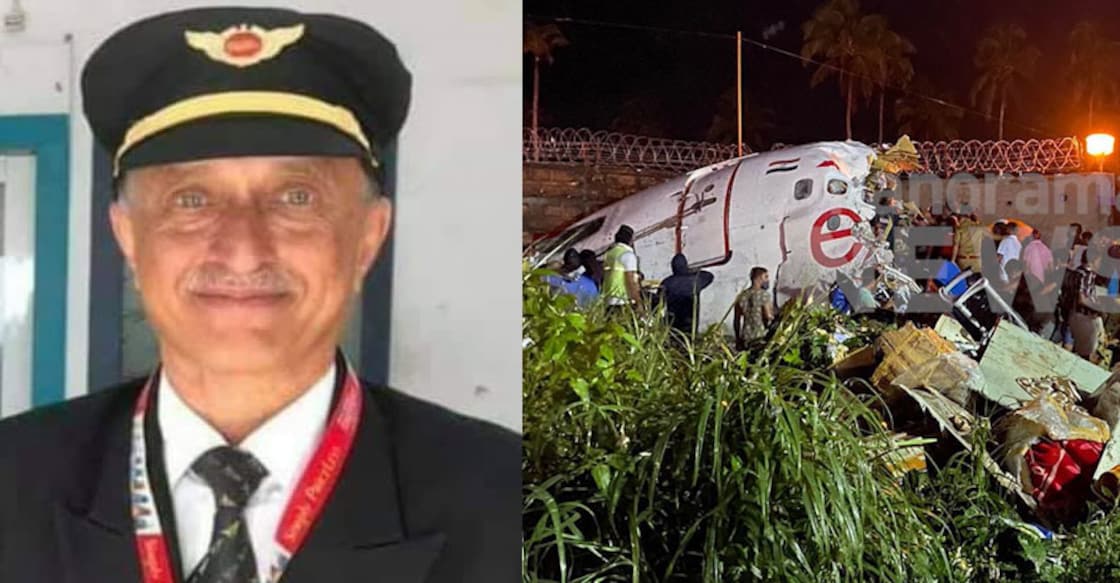'An honour to fly with you': A Keralite doctor's tribute to Air India pilot Deepak Sathe

Mail This Article
It is often said best things in life happen quite unexpectedly. For me, it happened during my biannual trip from Mangaluru to Dubai to visit my parents a few years ago.
A four-hour flight was the best bit of me time for an anaesthetist. No calls or decisions to make, no orders to obey or needs to be fulfilled. I had secured a 1-D aisle seat, the best seat in the Air India Express flight because I could stretch my legs in relative luxury.
As I made my way into the flight, I was surprised to see a person attired in a pilot's uniform – a white shirt with epaulettes, a neck tie loosened ever so – at the window seat 1-F. I never had the fortune of seeing a pilot in the passenger section, let alone sit next to one.
Sitting next to a pilot would have been the most exciting thing that happened to me in a flight, but still, I did not want to show my outright admiration - to the job or to the person. Thousands of questions popped up in my head which I always wanted to ask a pilot, an occupation I loved to be in but was sure would not qualify, thanks to my near imperfect vision.
But I was not sure he would entertain someone with such frivolities and I slipped quietly into my seat, after unceremoniously dumping my bag in the overhead compartment, going on to fiddle with my seat belt. Maybe I could ask him a few things and he would be kind enough to answer. But he looked tired. Maybe a little run into the ground. Something that was familiar as an anaesthesia resident. So I gave him the benefit of doubt and thought I would give him his space. As bitter as it felt, I knew I would not have wanted to speak, let alone make intelligible conversation with anyone.
The middle seat remained unoccupied. I had stuffed my headphones, iPad and phone in my handbag. Suddenly I heard a soft voice: “You can use the middle seat to keep your things if required”. When I looked up, I could see wry smile of the captain. I place my bag on the middle seat. And thus began a journey and a conversation of nearly four hours, where my iPad and headphones stayed nestled in their unpaid middle seat for the length of the journey. The first and last time, it had ever happened on a solo flight.
The first thing you noticed about the captain were his eyes. They were brighter than beacons but they exuded geniality. He spoke softly and it belied the fact that he was a captain. My assumptions of a captain came down crumbling faster than I could imagine. For the next four hours, we engaged in a conversation, covering myriad topics. It was a conversation that I remember to this day vividly. The things that were spoken have stayed with me but sadly, not the person.
We spoke about aviation, medicine, kids and career. He told me me about his training days, retirement from the Indian Air Force, how he joined Air India, about procuring and test piloting planes, about his military training had honed his piloting skills in later life. He told me the story of how he and a copilot had to land their flight in a torrential downpour on a flight with only a single working wind shield wiper, where he used his experience to teach the other pilot to align and subsequently land the flight using the row of lights that lined the runway, through the single usable wind shield. He told me how he and his wife were teaching kids how to maximise their potential - just like he had done with his own kids and told me to contact him once my then toddler, became a school going kid. He genuinely believed in changing the people he came into contact.
And he was curious to know about the functioning of an operation theatre, anaesthesiology worked and how people went in and out of slumber. His curiosity was palpable and genuine. He was talking to someone 25 years his junior as he would do with a peer. No condescension, no air of haughtiness. A rare conversation in an already rare space – 35,000 feet off the ground.
As an anaesthetist, I have always felt our jobs were similar to pilots in small ways. We, like pilots, have the onus to take care of the lives that are entrusted in us before we begin our jobs. The only difference being theirs involves multiple lives while ours involve only one at a time. We both were trained to face emergency situations - not to flinch or show fear in the face of adversity. And we blindly trust them to do the right things for us - as passengers and as patients.
And it could probably the reason why I happened to be at the receiving end of a once-in-a-lifetime conversation with former Wing Commander Deepak Vasanth Sathe - an exemplary pilot as endorsed by his peers, an extraordinary human through his deeds and a patron of positivity.

Whatever decisions you made on the IX 1344, have ended up saving many lives, because you would have put the lives of others in front of yours. That’s how you would have done it and that is how you would do it again. It was a pleasure and honour flying with you as a co-passenger, and most definitely my privilege.
(The author is an anaesthetist at a private hospital in Kochi.)

